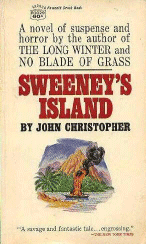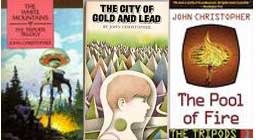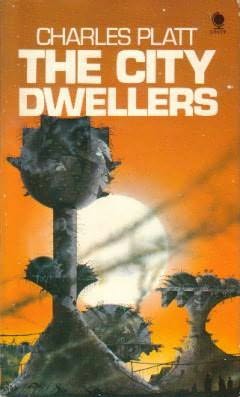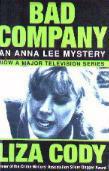 From the few biographical snippets I've read about John Christopher, he was a very prolific writer in the early part of his career. It really was a career for him and until the success of the Tripods trilogy, he had to write as much as possible. He cranked out several books a year, in several genres. He also never did any rewriting beyond the first chapter, supposedly. I don't know, his books read pretty well to me. Sweeney's Island is one of those, written in 1964. It's about a group of London bourgeois hangers-on of a very wealthy and connected guy named Sweeney. During one of his cocktail parties, Sweeney asks them to stay after where he proposes an impromptu trip on a new yacht he has just bought. He has clearly planned this very carefully, knowing that each of them either is dependent on his future generosity or is free enough to be able to just take off for a few weeks of ocean paradise.
From the few biographical snippets I've read about John Christopher, he was a very prolific writer in the early part of his career. It really was a career for him and until the success of the Tripods trilogy, he had to write as much as possible. He cranked out several books a year, in several genres. He also never did any rewriting beyond the first chapter, supposedly. I don't know, his books read pretty well to me. Sweeney's Island is one of those, written in 1964. It's about a group of London bourgeois hangers-on of a very wealthy and connected guy named Sweeney. During one of his cocktail parties, Sweeney asks them to stay after where he proposes an impromptu trip on a new yacht he has just bought. He has clearly planned this very carefully, knowing that each of them either is dependent on his future generosity or is free enough to be able to just take off for a few weeks of ocean paradise.However, it becomes apparent that Sweeney's plans are a little more elaborate than that when the ship ends up going into untrafficked routes far into the Pacific and then stops at an uninhabited tropical island far from any shipping lanes. Well, seemingly uninhabited. There are signs of previous habitation and even surprisingly organized agriculture. A constant cloud hangs over the islands larger two peaks, hiding it from view and there are other disturbing signs which I won't reveal.
The core of this book is about the people, the power and personality struggles that arise among them. Normally, I am not so interested in that path being emphasized but Christopher takes things to a pretty awesome extreme here. Shit gets really twisted. In some ways, this is very much like a Lord of the Flies with adults. Or more specifically, Lord of the Flies with british bourgeois adults from the mid-60s, a social group that Christopher rips to pieces in this book. Very satisfying.
I really enjoyed this book. The element of isolation and the social hierarchy reshaping itself once released from the strictures of authority and civilized society put this very much in the Post-Apocalyptic tradition, even though there isn't actually an apocalypse. Even if that genre isn't interesting to you, this is still a really entertaining and enjoyable book. It's turned up the intensity of my appreciation of John Christopher. I was at first only interested in checking out his PA books, but now I'm grabbing anything I can get my hands on.

 Found this one at a crazy, disheveled used bookshop way out on Mont-Royal. In the basement floor they had a few bins of english books, mostly crap from the late 80s and 90s, but I found this old british sci-fi book. It was thin and nicely yellowed, perfect for my travels to come. I didn't really know much going in, beyond that it was about characters in growing and dieing cities and it had some nice written language at the beginning.
Found this one at a crazy, disheveled used bookshop way out on Mont-Royal. In the basement floor they had a few bins of english books, mostly crap from the late 80s and 90s, but I found this old british sci-fi book. It was thin and nicely yellowed, perfect for my travels to come. I didn't really know much going in, beyond that it was about characters in growing and dieing cities and it had some nice written language at the beginning. I have toyed with Donald Hamilton in the past. It was a reading encounter with great promise that led to a real deflating letdown. He is best known for the popular Matt Helm series of manly paperbacks found in drugstore racks in the 60s and 70s. His early books were also said to be a big influence on the Parker books (written by Donald Westlake under the nom de plume Richard Stark), otherwise known as the best crime books ever. There were one or two books in particular whose titles I forget that I did read and they really did kick ass. I was so psyched because Hamilton had written so much more and they are so easy to find. I even had hope that the Matt Helm series might be competent. Unfortunately, something happened to Hamilton along the way and the other books I read by him had lost the tight, cold intelligence that had attracted Westlake. They were, instead, pandering to the audience (obvious macho tropes) and, far worse, demonstrated inefficient and emotional character behaviour. So I had to let the other Hamilton books on my on deck shelf and let go of that relationship.
I have toyed with Donald Hamilton in the past. It was a reading encounter with great promise that led to a real deflating letdown. He is best known for the popular Matt Helm series of manly paperbacks found in drugstore racks in the 60s and 70s. His early books were also said to be a big influence on the Parker books (written by Donald Westlake under the nom de plume Richard Stark), otherwise known as the best crime books ever. There were one or two books in particular whose titles I forget that I did read and they really did kick ass. I was so psyched because Hamilton had written so much more and they are so easy to find. I even had hope that the Matt Helm series might be competent. Unfortunately, something happened to Hamilton along the way and the other books I read by him had lost the tight, cold intelligence that had attracted Westlake. They were, instead, pandering to the audience (obvious macho tropes) and, far worse, demonstrated inefficient and emotional character behaviour. So I had to let the other Hamilton books on my on deck shelf and let go of that relationship. I picked this one up at the Kitsilano branch of the great Pulp Fiction bookstore in Vancouver. The British packaging caught my eye and the blurbs made it sound like it might have the right stuff. The protagonist is a female private investigator in contemporary London. Bad Company might not have been the best place to start since the heroine spends the whole time kidnapped, but it was an entertaining and well-written read nonetheless. The London underworld is richly portrayed and the lowlifes, from the stupid, inexperienced thugs who pull off the kidnapping to the serious hard and well-dressed ones who are trying to stop them as well fit well into the British empirical mold. The ending was a bit anti-climactic, but I think realistic. I'll be keeping an eye open for other Liza Cody books.
I picked this one up at the Kitsilano branch of the great Pulp Fiction bookstore in Vancouver. The British packaging caught my eye and the blurbs made it sound like it might have the right stuff. The protagonist is a female private investigator in contemporary London. Bad Company might not have been the best place to start since the heroine spends the whole time kidnapped, but it was an entertaining and well-written read nonetheless. The London underworld is richly portrayed and the lowlifes, from the stupid, inexperienced thugs who pull off the kidnapping to the serious hard and well-dressed ones who are trying to stop them as well fit well into the British empirical mold. The ending was a bit anti-climactic, but I think realistic. I'll be keeping an eye open for other Liza Cody books.

 This is a short (as many of his novels are) H.G. Wells novel that I found somewhere while traveling. It has a hilariously wrong yet accurate cover of a man and woman fighting off a dog in some ruins. It's wrong because though this scene actually happened, the picture looks like a Vallejo-esque barbaric fantasy. In the book, it is two wimpy future city-dwellers who, dissatisfied with modern life, make out for the country. At one point, they do get attacked by dogs, but the scene emphasizes how hopelessly unprepared they are for life outside of the city. I really should have scanned that cover, but I left it in the free bookshelf in the laundry room of my mom's apartment. Somebody took it so maybe it got read again, which would make it worth it.
This is a short (as many of his novels are) H.G. Wells novel that I found somewhere while traveling. It has a hilariously wrong yet accurate cover of a man and woman fighting off a dog in some ruins. It's wrong because though this scene actually happened, the picture looks like a Vallejo-esque barbaric fantasy. In the book, it is two wimpy future city-dwellers who, dissatisfied with modern life, make out for the country. At one point, they do get attacked by dogs, but the scene emphasizes how hopelessly unprepared they are for life outside of the city. I really should have scanned that cover, but I left it in the free bookshelf in the laundry room of my mom's apartment. Somebody took it so maybe it got read again, which would make it worth it.



